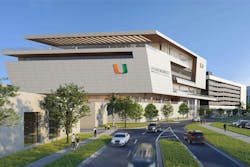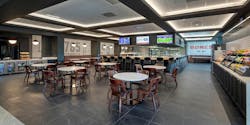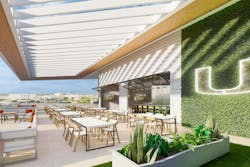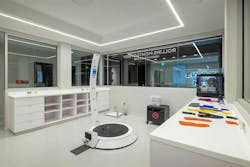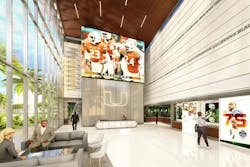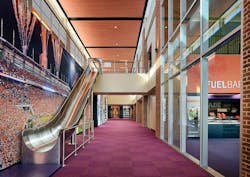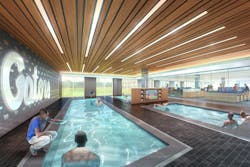As the demands on college athletes grow, so do the expectations for their training spaces. A weight room, locker room, treatment areas, and a few practice fields will no longer suffice. Today’s athletes need a comprehensive, modern facility that supports their physical and mental well-being, as well as NIL activities.
To take a closer look at this evolution, Kristi Dosh, founder of the Business of College Sports and contributor to Forbes, moderated a discussion with Dan Radakovich, vice president and director of athletics at the University of Miami, and Trevor Bechtold, a director of HOK’s Sports + Recreation + Entertainment practice.
Here are some key takeaways:
1. The Rise of One-Stop Buildings
Competing in a Power Five football conference as a student-athlete is akin to holding down a full-time job. These athletes face a grueling year-round schedule that devours an enormous amount of their time.
“Having a single building with things like nutrition, strength and conditioning, and rehab and recovery all under one roof is important for making sure you’re as efficient with their time as possible,” said Radakovich.
“We’re integrating dining into these buildings with chef-prepared meals and nutrition guidance within demonstration kitchens,” added Bechtold. “And then there are things like the barbershops and recording studios that help create that one-stop shop.”
2. The U’s New Training Facility Will Be Special
In Coral Gables, Fla., HOK is designing a new football operations center for the University of Miami. Meeting the needs of the Hurricanes’ on-campus “forever” football home on a compact footprint required the project team to go vertical with a seven-story structure.
This 172,000-sf football training facility will offer the best amenities in sports medicine, strength and conditioning, nutrition, sports psychology, and personal branding. A few of the unique features include:
- A first-floor dining hall with indoor and outdoor seating will provide a communal space for all of the University’s student-athletes to come together.
- Moving more than 125 players, coaches, and staff through a building of this size efficiently takes time. To speed up the process, the vertical circulation system incorporates escalators along the window walls and oversized elevators.
- A bridge across the canal will link the new facility to the existing Carol Soffer Indoor Practice Facility.
- A 7,500-sf rooftop terrace on the seventh floor will provide stunning views of the campus and Miami’s skyline. “This will be an amazing space for the student-athletes, the coaches, the university community and alumni,” said Bechtold.
3. Breakthroughs in Training and Recovery
HOK’s team is continually researching new ways these training facilities can enhance performance, recovery, and the overall well-being of these student-athletes.
According to Bechtold, locker rooms have evolved from being solely for gear storage to include creature comforts like zero-gravity chairs, gaming areas, and spa-like recovery amenities. Training rooms have also transformed, offering active and passive recovery options, from massage tables to cryotherapy, nap rooms, and dry-flow beds. Even weight rooms have integrated sport science components and pre- and post-fuel areas.”
In addition, new motion capture technology helps identify and prevent potential injuries before they happen. A recent project at Auburn University installed Falcon Pursuit, which creates an avatar of each student-athlete to fit their equipment to their body type and even produces custom-printed insoles for their cleats.
4. Combine Purpose and Personality
While every football training facility shares specific building blocks, each must have a distinct personality that reflects the university’s culture, legacy, and traditions. The design should elevate the experience for current players and recruits alike.
“It’s very important that training facilities take on the persona of the university and the coaching staff,” said Radakovich.
The branding falls into two buckets, noted Radakovich. “One is the iconic moments in your program’s history that you want to highlight forever. And then it’s the student-athletes who are involved in the program … It’s important to make sure they can see themselves in the building.”
5. If You’re Not Having Fun, You’re Not Doing It Right
Clemson University’s Alan N. Reeves Football Operations Complex, which opened in 2017 during Radakovich’s tenure as director of athletics, offers much more than functionality. The complex includes a slide connecting the primary hall to the building lobby. It also features miniature golf, bowling, a movie theater, and a gaming lounge. Courts for basketball, volleyball, and bocce ball allow players and coaches to build camaraderie while competing off the field.
“Dabo Sweeney, head coach there, wanted that building to be effective and efficient, but it also needed to be fun,” said Radakovich.
“We want to find that right balance between key functional components and amenities that allow these guys to break away and work on their whole body health,” added Bechtold.
6. Design for What’s Next
As college football training facilities keep changing, architects must create flexible spaces within these buildings to accommodate future growth. A multipurpose room, for example, could evolve into more office space or a yoga studio.
“One of the great things that Trevor and his team have been able to do [for the Hurricanes’ new facility] is put some space on each floor to help with items that we don’t know will be important yet,” said Radakovich. “It’s going to be a building that can grow within its walls.”
Questions about college football training facilities? Contact Trevor Bechtold at [email protected]
